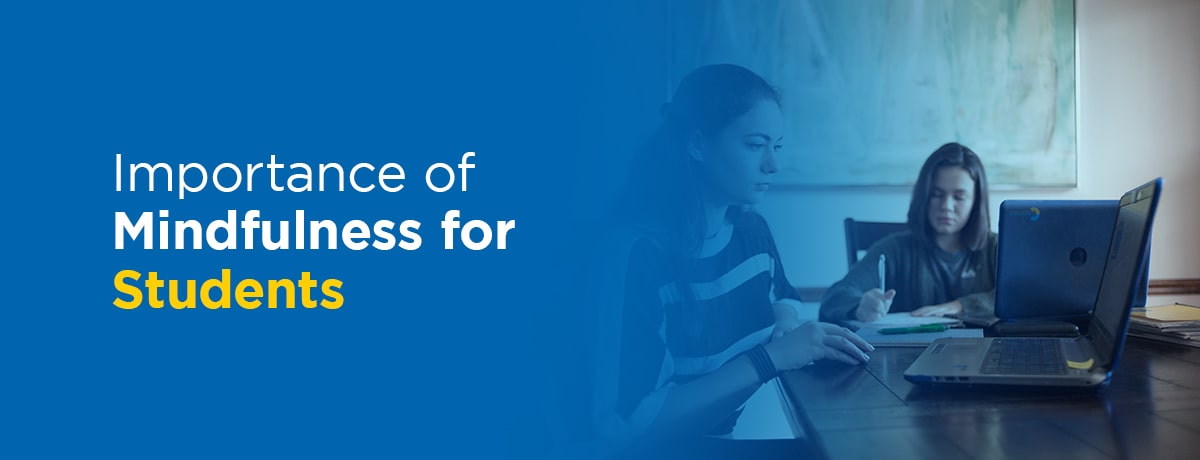Enrollment Now Open for Second Semester. Click Here
Enrollment Now Open for Second Semester. Click Here

Have you ever felt overwhelmed by the responsibilities of everyday life? Always trying to check off the next item on your to-do list can make it hard to focus on the present. Maybe surprisingly, children are prone to experiencing some of the same feelings. In fact, studies show that 7.1% of children ages 3-17 have been diagnosed with anxiety.
Over the past decade, early education has become more rigorous than ever. These days, children are pressured to reach high expectations resulting in stress, anxiety, and the inability to focus. Unfortunately, constant worry is distracting, preventing children from reaching their full potential at school.
On the bright side, mindfulness is a practice that can help relieve some of your child’s stress. Specifically, mindfulness meditation can decrease anxiety levels significantly. It emphasizes the importance of the present rather than concerns about the future or the past, which means students can perform better in school.
This is a calming technique inspired by a Buddhist philosophy that has been practiced for centuries. The practice of mindfulness is centered around being fully present, focusing on the current moment. It helps settle the mind to help you connect with your inner thoughts and feelings.
Fortunately, mindfulness is a natural state of mind that anyone can practice — you can be mindful anytime, anywhere. Here are a few examples of how you can apply mindfulness in everyday life:
While mindfulness is beneficial for everyone, it’s especially so for kids who are still learning how to cope with life’s challenges. It’s a simple concept that can make a big impact. Explaining mindfulness to children will help them develop healthy mental habits so they feel confident in their performance at school and in life.
Here are some specific benefits of mindfulness for kids:
One of the primary causes of stress and anxiety is the internal and external pressure that children face. This includes expectations from their parents and teachers along with the personal goals they keep for themselves. As a result, kids worry about their grades, making friends, or performing at their dance recital. Like adults may know from personal experience, kids can get caught up in a cycle of negative thoughts about their self-worth related to school, relationships, sports, and more.
Practicing mindfulness helps students block out their concerns about the future, so they can relax and connect with what’s important in the present. It helps them feel calm and relaxed so they can conquer stressful situations with a positive attitude. Ultimately, children will experience less stress so that they can tackle each day at a time.
Racing thoughts can distract your child from completing their schoolwork or studying for a test. For many kids, staying focused can be challenging when there are distractions everywhere. One of the benefits of mindfulness for children is that it can help them refocus their attention on the task at hand.
A brief 10-minute meditation can help students gather their thoughts so that they can perform better in school.
Both emotional and social intelligence is the foundation for how children interact with other people. It’s how they regulate their emotions and form relationships. Mainly, children develop their emotional and social intelligence while they’re in school.
Specifically, mindfulness meditation allows students to pause and reflect on their emotions. A child who can understand their own feelings can express themselves more clearly, as they become better listeners and build stronger, more trusting relationships with their peers and others outside of school.
Those who practice mindfulness can experience an increase in their cognitive performance. Through meditation, students clear their heads and connect with their thoughts to improve their mental processing. It can help boost their understanding and retention of new information.
One study found that a semester-long mindfulness training improved students’ memory and attention skills. These results suggest that practicing mindfulness could lead to a major improvement in your child’s performance at school.
Sometimes, students can be sitting right in front of their teacher and not remember a single word they said in class. How is this possible? When children are stressed or distracted, they let their minds wander and lose track of what’s happening around them. Even though they’re in the room, their mind has drifted off to another world. Taking a moment to practice mindfulness can help draw them back to reality so they can focus on their schoolwork.
Research has found that people who practice mindfulness can boost their short-term memory. The findings suggest that focusing on the moment makes it easier to learn and retain new information. Therefore, students who practice mindfulness can develop strong memories and perform better in school.
While some people might think perfectionism is a good thing, it can prevent your child from reaching their full potential. Being a perfectionist means you tend to worry over minor details and have trouble completing projects. It’s actually a sign of greater challenges like anxiety disorders and intense fear.
Practicing mindfulness can help students overcome perfectionism. Instead of searching for flaws or comparing themselves to others, children can concentrate on their own thoughts and feelings. This activity teaches kids to have a positive outlook on themselves and their lives. As a result, they feel more confident in their abilities and understand that failure can be a learning opportunity.
Minimizing distractions is an important component of online learning. At CCA, we encourage our students to practice mindfulness to help them stay focused. CCA students have the flexibility to create their own daily schedules and work at their own pace, giving them the freedom to practice mindfulness anytime. To learn more about how CCA supports the practice of mindfulness, contact us today.
Enrollment Now Open for Second Semester. Click Here